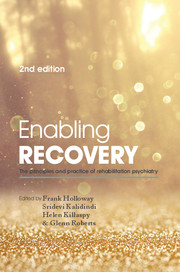Book contents
- Frontmatter
- Contents
- List of contributors
- List of figures, tables and boxes
- Preface
- Part 1 Setting the scene
- Part 2 Treatment approaches
- Part 3 Key elements of a rehabilitation service
- 16 Key elements of a rehabilitation service: overview
- 17 Rehabilitation in hospital settings
- 18 Community-based rehabilitation and recovery
- 19 Housing: a place to live
- 20 Work and employment
- 21 Peer support in mental health services
- 22 Leadership, management and service development in rehabilitation practice
- Part 4 Special topics in psychiatric rehabilitation
- Part 5 Future directions
- Index
18 - Community-based rehabilitation and recovery
from Part 3 - Key elements of a rehabilitation service
Published online by Cambridge University Press: 02 January 2018
- Frontmatter
- Contents
- List of contributors
- List of figures, tables and boxes
- Preface
- Part 1 Setting the scene
- Part 2 Treatment approaches
- Part 3 Key elements of a rehabilitation service
- 16 Key elements of a rehabilitation service: overview
- 17 Rehabilitation in hospital settings
- 18 Community-based rehabilitation and recovery
- 19 Housing: a place to live
- 20 Work and employment
- 21 Peer support in mental health services
- 22 Leadership, management and service development in rehabilitation practice
- Part 4 Special topics in psychiatric rehabilitation
- Part 5 Future directions
- Index
Summary
Introduction
This chapter provides an account of the work of community mental health teams that aim to promote the rehabilitation and recovery of the people they are serving. Both rehabilitation and recovery are ‘everyone's business’ and the principles and practices discussed in the chapter are relevant to all community mental health services. The roles of specialised teams offering assertive outreach, early intervention in psychosis and, in particular, community rehabilitation are, however, described in some detail.
It is important at the outset to emphasise three issues that are often overlooked. First, services are not in themselves treatments – they are, rather, vehicles for delivering treatment and care. Second, a vital element of good treatment and care is the therapeutic relationship between those providing services (the individual practitioner, the treatment team and the wider care system) and the person receiving services (the patient, client or service user) and her or his support network. Third, high-quality work within rehabilitation and recovery almost invariably takes place in the context of effective team working. Effective teams are supportive of the practitioner, have a positive therapeutic culture, reflect on their work and make use of the skills and experience of all team members.
Principles
Rehabilitation services must strive to ensure they work collaboratively and in a recovery-focused, person-centred way. The key aims are to support service users in attaining their goals and moving towards selfmanagement of their mental health condition, while ensuring that the challenges they face are adequately addressed. These challenges include risks such as social isolation, self-neglect, relapse into acute illness, challenging behaviours, comorbid substance misuse, inability to cope, exploitation in the community and co-occurring physical health problems (Kalidindi et al, 2012). To put the laudable aims of rehabilitation services into practice, effective engagement, assessment, formulation and care planning are essential.
Involvement of family, carers and others in the social network of the service user is likely to be important in bringing about sustained positive change. Families need information, advice and support from statutory services and, sometimes, specific interventions such as family work or therapy (see Chapter 10, ‘Family interventions’).
- Type
- Chapter
- Information
- Enabling Recovery , pp. 279 - 294Publisher: Royal College of PsychiatristsPrint publication year: 2015



